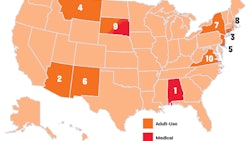
More patients are set to gain access to Texas’ limited medical cannabis program beginning Sept. 1. But those new patients won’t be receiving the same tetrahydrocannabinol (THC) benefits available in many other states.
Signed into law by Republican Gov. Greg Abbott on June 15, House Bill 1535 expands the state’s medical cannabis qualifying conditions to include cancer and post-traumatic stress disorder (PTSD).
House members originally passed the legislation to include chronic pain as a qualifying condition, in a 134-12 vote on April 28, but the Senate nixed that condition from its amended legislation that passed in a 31-0 vote a month later.
RELATED: Texas Senate Approves Bill to Decriminalize Adult-Use Cannabis
The House also intended on raising the THC limit for medical cannabis from 0.5% to 5%, but the Senate lowered that increase to 1% in its approved version of the bill. The THC cap differs from many other state medical programs that don't have low-potency limits, like neighboring Oklahoma.
Republican Rep. Stephanie Klick, who sponsored H.B. 1535, had the opportunity to reject the Senate’s changes with her fellow sponsors in the lower chamber. But, instead of risking the watered-down expansion to the medical program, the House concurred in a 119-25 vote.
“While these are extremely important changes, Texas NORML is saddened to see such integral elements removed from the legislation by the Senate, such as the addition of chronic pain as a qualifying condition, the ability for a review board to approve new qualifying conditions, as well as a new THC cap of 5 percent,” Texas NORML Executive Director Jax Finkel said in a release.
“We are encouraged by broadened efforts and will continue to advocate for a robust program which allows doctors to decide which conditions and symptoms could benefit from medical cannabis, removing the arbitrary THC cap, and solidifying patient protections,” he said.


























